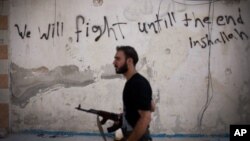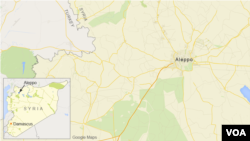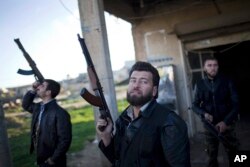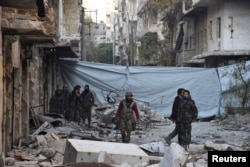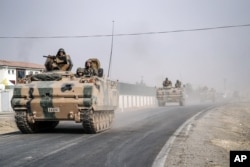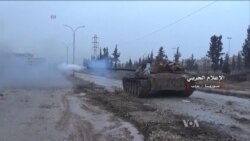Syrian rebel commanders and opposition politicians insist the uprising against President Bashar al-Assad will continue even if they lose their tenuous hold on parts of Aleppo, the country’s second-largest city.
Most military observers and diplomats estimate it is only a matter of weeks before the rebel-held eastern districts of Aleppo will fall entirely into the hands of the Russian-backed regime forces. Even so, rebel commanders say they will fight on, using neighboring Idlib Province to continue their guerrilla-style war against the Assad regime.
The prime minister of the Syrian Interim Government, formed by an opposition umbrella alliance, added his voice to a defiant chorus, saying, in an interview with VOA, that the loss of Aleppo won’t mark the end of the more than five-year-long revolution. “This will go on for a few more years,” says Jawad Abu Hatab.
Hatab said he doesn't think there can be an overall military win for the rebels, but he argues resistance will be maintained and eventually Assad will go - “he will eventually be killed,” Hatab says. When that happens, a political solution will be possible. “When this conflict began, I said it would take 10 years,” he adds.
Keep fighting
Other opposition leaders, as well as rebel commanders and their supporters, say they have no alternative but to keep fighting, arguing they can’t make a deal with Assad and wouldn't trust an amnesty offer.
“We want freedom and democracy in Syria without Assad and his security apparatus. No one can trust this regime and go back to Syria. If Bashar said, ‘There’s no problem, come back’ and I did, I would be killed immediately,” says Gen. Salim Idris, a former commander-in-chief of the Free Syrian Army who defected from the Syrian military in the early days of the revolt.
U.S. military and intelligence officials, speaking to VOA on condition of anonymity, acknowledge the days are numbered for Syrian opposition forces in Aleppo, with one saying, “The slaughter could go on for weeks.”
The officials also agree with Syrian rebel commanders that Aleppo will not end the fight to oust Assad.
“The opposition will not be easily defeated,” the official said. “The possibility exists for the five-year Syrian civil war to descend into a protracted battle fought through hit-and-run-style attacks, which regime forces are not prepared to handle."
Such tactics, U.S. officials say, have frustrated Syrian regime forces in the past. And for the regime to even push the rebels to the brink in Aleppo, it had to resort to a scorched earth bombing campaign with considerable help from the Russians, as well as significant support from Iranian-directed Shi’ite militias.
“The moderate opposition has grown in skill and size over the years to the point where they won’t disappear,” said a U.S. intelligence official.
One U.S. intelligence estimate puts the size of the moderate Syrian opposition forces at more than 100,000 fighters. And it’s not just the moderate rebel groups that are managing to survive.
“None of these parties, whether the moderates or whether the hard core Islamists, none of those parties has actually been dealt any decisive blows,” said Stratfor senior military analyst Sim Tack. “That’s something that the Syrians and the Russians have not been able to achieve, to knock anyone out of the fight.”
Some rebels are drawing comfort from remarks earlier this week by Qatar’s foreign minister, Sheikh Mohammed bin Abdul-Rahman al-Thani, who told the Reuters news agency that the Gulf emirate wasn’t thinking of abandoning the anti-Assad insurgents and would continue to arm them.
“This support is going to continue. We are not going to stop it. It doesn’t mean that if Aleppo falls we will give up on the demands of the Syrian people,” he said. Nor if President-elect Donald Trump decides to end U.S. support for the rebels, which he has indicated he may. “We are not going to change our position.”
Even with arms supplies from the Gulf states, the rebels face a massive military dilemma - what strategy do they pursue after losing Aleppo? They are suffering losses elsewhere in the country - in the south, militias are barely holding their ground and in the Damascus suburbs, the regime is also making advances.
Military strategy
In recent months, Aleppo has been one of the twin geographical anchors for the rebellion.
The other, Idlib, seems now to be in the sights of the regime. Russian warplanes have already started pummeling the province and in mid-November, Russian Defense Minister Sergei Shoygu announced the start of a “major operation” that he said would target IS and al-Qaida in Idlib.
As with Aleppo, the FSA and Islamist militias are bearing much of the brunt of airstrikes, including from sorties flown by Su-33 ‘Flanker-D’ fighters launched from the Russian aircraft carrier ‘Admiral Kuznetsov’ in the eastern Mediterranean.
Yet some in the West think such a strategy is destined to backfire.
“They have succeeded in pushing many pretty moderate groups into the arms of Nusra,” a U.S. official said, referring to the Syrian al-Qaida affiliate that has since rebranded itself as Jabhat Fatah al-Sham.
The likely loss of Aleppo may only serve to accelerate that process, playing into al-Qaida’s long-term strategy in Syria, based on intertwining itself with the local populations while carefully selling itself as the only group capable of defeating the Syrian regime.
Former FSA Gen. Idris sees the strengthening of al-Qaida and groups like it as inevitable.
“Assad staying in power fuels the extremism,” he said. “If the conflict continues for many more years, it will just help al-Qaida and the other extremists - they thrive on chaos and instability.”
At the same time, unlike some of the U.S. officials, Idris believes the loss of Aleppo will deal an irreversible blow to the status of what remains of the moderate and more secular militias.
Aron Lund, an analyst with the Carnegie Endowment for International Peace, a Washington-based research institution, believes the loss of Aleppo would mark, in effect, “a strategic checkmate for the Syrian opposition, as currently construed.”
He acknowledges that foreign-backed rebel contingents in other locations could continue a fight but it wouldn’t compensate “for the loss of Aleppo, or lead to a dismantling of Assad’s regime that opposition backers seek, or even compel him to accept meaningful compromises,” he adds.
Already, some rebel fighters admit they may join with the al-Qaida-linked Jabhat Fatah al-Shama and the hardline Islamist group Ahrar al-Sham, which al-Qaida veterans helped to found.
Others are prepared to walk away.
Mohammed, a rebel fighter with a militia aligned with the Free Syrian Army, is currently resting in the Turkish border town of Kilis. He said the loss of Aleppo would end his commitment to the war. “It has been too long, this war. It will end up as an even more difficult guerrilla war - I am just too tired.”
“But many will fight on - in Idlib, in the mountains of Latakia and with the Turks in northern Syria,” Mohammed added.
Turkey's role
Indeed, the evolving Turkish role in Syria will also likely be crucial to the fate of many militias, both in terms of supplying arms and allowing arms from other countries to cross into Syria.
Some rebels fear that the Turks could be bought off in a deal with Damascus.
“If Assad and Moscow guarantee there will be no Kurdish state in northern Syria, at what point does Ankara decide to withdraw its support,” queried a top rebel commander, who asked not to named as his militia has recently received weapons from Turkey.
“To be honest, I don’t trust the Turks and in the end they will decide to do what is in their interests and not ours,” he added.
Watch related video:




